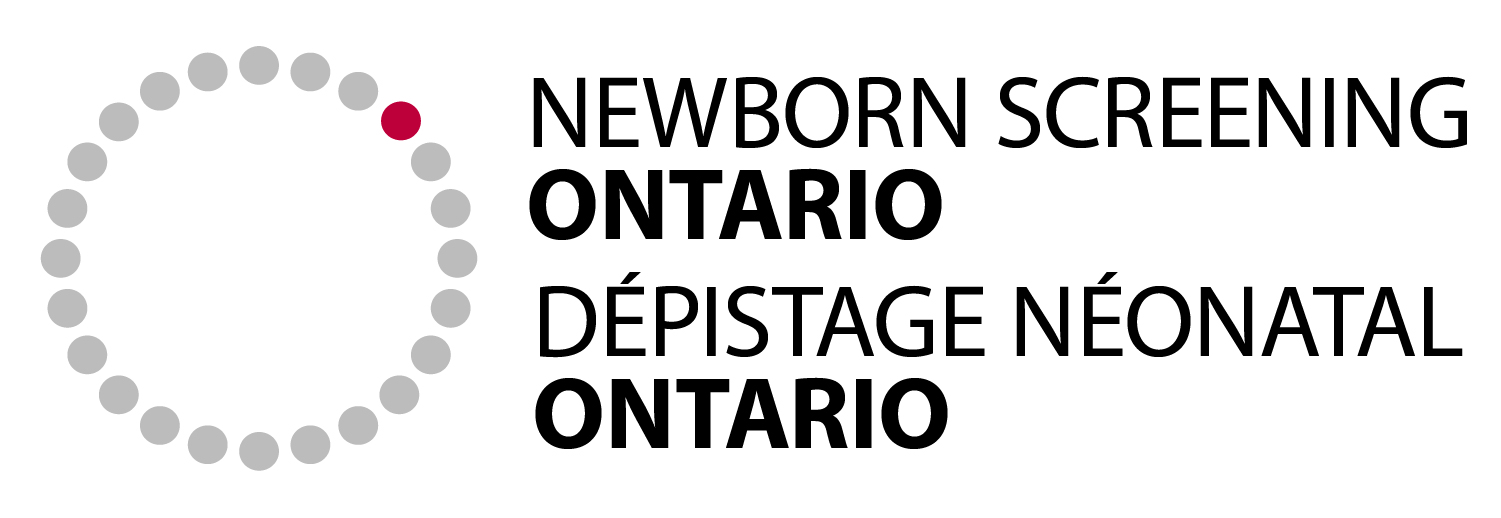- Propionic acidemia (PA), methylmalonic acidemia (MMA) and cobalamin A & B defects are all organic acid diseases.
- Babies with these diseases can be identified through newborn screening because they have a screen positive result due to an elevated C3 level.
Cobalamin A & B Defects
At a glance
| Approximate incidence in Ontario: | Marker measured: | Screening can prevent: | Treatment: |
| 1 in 50,000 | C3 | Failure to thrive, encephalopathy, coma, death | Low protein diet, avoid fasting, +/- vitamin B12 supplementation |
- In Ontario, a heel prick is used to take a few drops of blood from each baby shortly after birth. The blood is tested for more than 25 treatable diseases, including propionic acidemia (PA), methylmalonic acidemia (MMA), and cobalamin A & B defects.
- A screen positive result means that more tests are needed to know whether or not a baby has one of these diseases. It does not mean that a baby has a disease. Babies identified at a young age through screening can be treated early to help prevent health problems.
What are propionic acidemia (PA), methylmalonic acidemia (MMA) and cobalamin A and B defects?
PA, MMA and cobalamin A and B defects are all inherited (genetic) diseases.
- Babies with these diseases cannot break down protein and certain fats due to an enzyme that is missing or not working properly.
- Isoleucine, valine, methionine and threonine are amino acids (building blocks of protein) found in many of the foods we eat, including breast milk and infant formula.
- Babies with these diseases cannot make these amino acids into energy for the body or use them for growth.
- If the body cannot break down these fats and amino acids, harmful substances build up within the baby’s body.
Screening positive for PA, MMA, and cobalamin A and B defects
- It is normal for parents and guardians to feel worried when their baby has a screen positive result. A ‘screen positive’ result does not mean that a baby has a disease. It means that there is a chance that the baby may have one of these diseases.
- Follow-up testing is important to find out whether the baby truly has a disease.
- The baby’s health care provider or a health care provider at a newborn screening regional treatment centre will discuss the results with the baby’s family.
Possible follow-up test results
- Normal – the baby does not have a disease.
- Abnormal – the baby has one of these diseases and will need treatment. The family will be supported by a team of caring specialists.
- Inconclusive – more testing is required. The baby will be followed closely by a metabolic specialist to ensure that he/she receives optimal care.
- The mother has B12 deficiency - baby may have to be treated for B12 deficiency.
Babies who have PA, MMA or cobalamin A or B are usually healthy at birth, but they are at risk for a serious health condition called a metabolic crisis. A metabolic crisis is a life-threatening episode caused by the build-up of harmful substances in the blood.
Symptoms of a metabolic crisis include:
- poor feeding
- vomiting
- low muscle tone
- excessive sleepiness
- irritability
- rapid breathing
- muscle spasms
If a metabolic crisis is not treated, seizures, stroke, coma, brain damage and sometimes death can occur. Early treatment helps to prevent and limit metabolic crises in affected children and allow children with these diseases to lead the healthiest lives possible.
Early treatment also helps prevent and limit other symptoms which include:
- poor growth
- balance and coordination problems
- seizures
- immune system problems
- kidney problems
- vision loss
- learning delay
- intellectual disability
Treatment is started as early as possible and is lifelong.
-
Treatment may involve a combination of:
- Frequent feeding, especially when ill (babies with these diseases must not go a long time without food)
- A low protein diet and special medical foods
- Vitamins and supplements such as vitamin B12 and carnitine, which are prescribed by a metabolic doctor
- Antibiotics
- Occasionally liver and kidney transplants are needed
- A team, including a metabolic doctor and a dietician, cares for babies with these diseases.
- Regular follow-up tests are used to monitor and adjust treatments.
- Babies with these diseases have their health and development checked regularly.
- If signs of a metabolic crisis (above) occur, urgent medical care must be found.
Living with PA, MMA, and cobalamin A and B defects
- Treatment helps to prevent the symptoms and gives babies the best chance possible for normal growth and development.
- For babies with these diseases, treatment helps to prevent life-threatening episodes which are more common early in life, and helps reduce or prevent other symptoms.
- Treatment may allow babies to lead healthy lives with normal growth and intelligence.
If your baby has screened positive for PA, MMA, or cobalamin A & B defects, click here for more information.
Contact Us
Children’s Hospital of Eastern Ontario
415 Smyth Road
Ottawa, Ontario K1H 8M8
Toll-Free: 1-877-627-8330
Local: (613) 738-3222
Fax: (613) 738-0853
